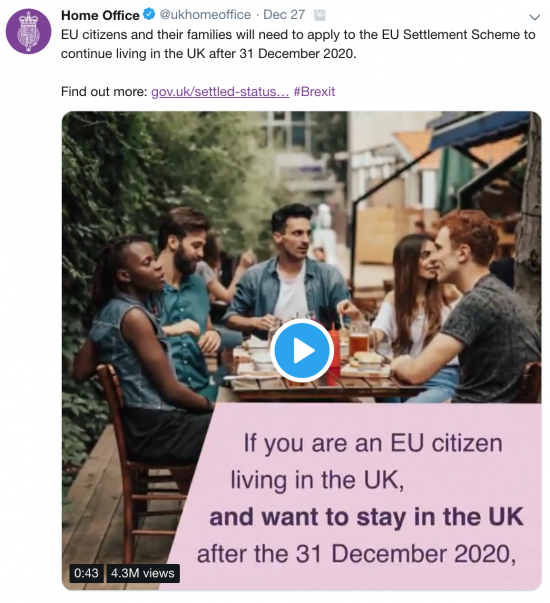Just after Christmas,
the Home Office published this advice
to ‘EU citizens’ about the requirement to register if they want to stay in the
UK after Brexit.

The wording is very
clear – “If you are an EU citizen living
in the UK and want to stay in the UK after the 31 December 2020…”. I’m not alone in spotting the problem with
the use of words here, because I think that I – along with the overwhelming
majority of the UK’s population, fall into that category (although I’ll admit
that I do sometimes start to wonder about the ‘want to stay’ part given the
trajectory on which the UK government has placed us). But I’m unquestionably an EU citizen as
things currently stand.
Professor Richard
Murphy has already blogged
on this, suggesting that we should all follow the UK Government’s clear advice
as EU citizens and register our desire to stay after Brexit. It’s an interesting form of protest, and it’s
hard to see how the UK Government can really complain if millions of those of
us who are currently EU citizens simply comply with their poorly-worded demand that we
should register.
But underlying this
is a rather more general, and slightly sinister, misuse of terminology to describe
people. Here’s another example
from Parliament’s website, talking about the proportion of NHS staff who are EU
citizens. It claims that 5.6% of NHS
staff are EU nationals but goes on to say that all but 12.7% (i.e. 87.3%) are
UK nationals. But at what point did that
87.3% cease being EU citizens? The
answer is that they did not – they might cease to be such on 29th
March, but as of today, and at the time that this research report was published
in October, the proportion of EU citizens working in the NHS was 92.9%, and
there was and is effectively no legal distinction between those who happen also
to be UK nationals and those who happen to be nationals of other EU member
states.
These are far
from being the only examples; the BBC and media are full of reports about ‘EU
citizens’ which invariably, it seems, is a reference only to non-UK EU
citizens. Does this blurring of
terminology matter? At one level, of
course not. I know what they are trying
to say and understand why they are drawing a distinction when talking about the
situation which will exist post-Brexit.
But at another level it does matter, partly because (as Prof Murphy
pointed out) it’s about creating difference and ‘otherness’ where none
currently exists, but also because it diverts attention away from what the
government is actually doing here. The
truth isn’t that we are not currently EU citizens, it is that that citizenship
is going to be stripped from us at the end of March by deliberate government action. The form of words which has gained widespread
currency treats all other EU citizens as though they are the odd ones, when the
reality is that it’s UK nationals whose status is changing the most.




No comments:
Post a Comment